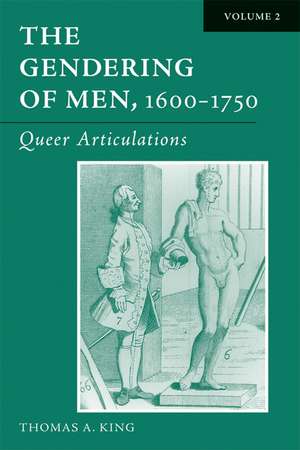The Gendering of Men, 1600–1750: Volume 2, Queer Articulations
Autor Thomas A. Kingen Limba Engleză Hardback – 4 aug 2008
The queer man’s mode of embodiment—his gestural and vocal style, his posture and gait, his occupation of space—remembers a political history. To gesture with the elbow held close to the body, to affect a courtly lisp, or to set an arm akimbo with the hand turned back on the hip is to cite a history in which the sovereign body became the effeminate and sodomitical and, finally, the homosexual body. In Queer Articulations, Thomas A. King argues that the Anglo-American queer body publicizes a history of resistance to the gendered terms whereby liberal subjectivities were secured in early modern England.
Arguing that queer agency preceded and enabled the formulation of queer subjectivities, Queer Articulations investigates theatricality and sodomy as performance practices foreclosed in the formation of gendered privacy and consequently available for resistant uses by male-bodied persons who have been positioned, or who have located themselves, outside the universalized public sphere of citizen-subjects. By defining queerness as the lack or failure of private pleasures, rather than an alternative pleasure or substance in its own right, eighteenth-century discourses reconfigured publicness as the mark of difference from the naturalized, private bodies of liberal subjects.
Inviting a performance-centered, interdisciplinary approach to queer/male identities, King develops a model of queerness as processual activity, situated in time and place but irreducible to the individual subject's identifications, desires, and motivations.
Preț: 453.99 lei
Preț vechi: 565.92 lei
-20% Nou
Puncte Express: 681
Preț estimativ în valută:
86.87€ • 94.74$ • 73.25£
86.87€ • 94.74$ • 73.25£
Carte indisponibilă temporar
Doresc să fiu notificat când acest titlu va fi disponibil:
Se trimite...
Preluare comenzi: 021 569.72.76
Specificații
ISBN-13: 9780299226206
ISBN-10: 0299226204
Pagini: 583
Ilustrații: 47 b-w illustrations
Dimensiuni: 152 x 229 x 43 mm
Greutate: 0.91 kg
Ediția:1
Editura: University of Wisconsin Press
Colecția University of Wisconsin Press
ISBN-10: 0299226204
Pagini: 583
Ilustrații: 47 b-w illustrations
Dimensiuni: 152 x 229 x 43 mm
Greutate: 0.91 kg
Ediția:1
Editura: University of Wisconsin Press
Colecția University of Wisconsin Press
Recenzii
“In inspired scholarship, King shows how the queer subject is articulated discursively not only through primary written works but through theatrical imagery as well. Queer Articulations is sure to become the standard work on perceptions of eighteenth-century sexuality and masculinity.”—Hans Turley, University of Connecticut
“King proposes that the eighteenth-century sodomite, or molly, identified himself with an older aristocratic culture and was thereby excluded from the new public sphere inhabited by men who organized their sexual lives around domestic privacy. Speech and gesture from the past are very hard to document: this book opens new doors.”—Randolph Trumbach, Baruch College and the Graduate Center, City University of New York
“Provocative and eloquent, Queer Articulations confirms that Thomas A. King is a leading scholarly voice on the historical complexities of Enlightenment sexuality and gender. King’s sophisticated performance analysis produces a rich genealogy of queer practices rather than a history of queer subjectivities, offering the challenging point that queerness is at the heart of what modernity’s social and political agenda silently disavows.”—Raymond Stephanson, University of Saskatchewan
“[A]s a study of eighteenth-century English performative sexualities in their full contextualization—and the importance of these for the politics of ‘queer’ in the present—Queer Articulations, the second volume of The Gendering of Men, 1600-1750, is an impressive—and perversely hopeful—potentially field-changing work.”—Carla Freccero, Journal of British Studies
“Thomas King’s second volume of The Gendering of Men is an ambitious work that offers new theoretical methods by which scholars of gender and sexuality might rethink the way we approach the history of homosexuality. . . . His project is avowedly committed to examining instances of queer agency and practice, and the connections he makes between early modern queer practice and modern-day queer subjectivity are sound and forceful.”—John C. Beynon, Theatre Journal
Notă biografică
Thomas A. King is associate professor of English at Brandeis University, where he teaches early modern and eighteenth-century studies, gender and queer studies, and performance studies. Prior to his teaching career, King worked as an A.E.A. stage manager in Chicago. He is the author of The Gendering of Men, 1600–1750: Volume 1, The English Phallus, also published by the University of Wisconsin Press.
Descriere
The queer man’s mode of embodiment—his gestural and vocal style, his posture and gait, his occupation of space—remembers a political history. To gesture with the elbow held close to the body, to affect a courtly lisp, or to set an arm akimbo with the hand turned back on the hip is to cite a history in which the sovereign body became the effeminate and sodomitical and, finally, the homosexual body. In Queer Articulations, Thomas A. King argues that the Anglo-American queer body publicizes a history of resistance to the gendered terms whereby liberal subjectivities were secured in early modern England.
Arguing that queer agency preceded and enabled the formulation of queer subjectivities, Queer Articulations investigates theatricality and sodomy as performance practices foreclosed in the formation of gendered privacy and consequently available for resistant uses by male-bodied persons who have been positioned, or who have located themselves, outside the universalized public sphere of citizen-subjects. By defining queerness as the lack or failure of private pleasures, rather than an alternative pleasure or substance in its own right, eighteenth-century discourses reconfigured publicness as the mark of difference from the naturalized, private bodies of liberal subjects.
Inviting a performance-centered, interdisciplinary approach to queer/male identities, King develops a model of queerness as processual activity, situated in time and place but irreducible to the individual subject's identifications, desires, and motivations.
